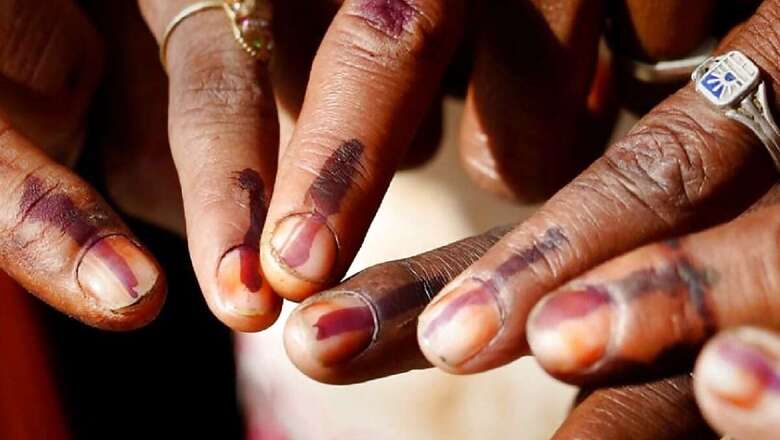
views
The sudden spread of the Covid-19 pandemic all across the world has disrupted every aspect of public life. More importantly, the threat of the virus is unlikely to end any soon, as the surge of fresh cases continues in many parts of the world and the confirmed news of a reliable vaccine is yet to come by.
Under such circumstances, with the resumption of economic and other essential services, public life is slowly moving towards the “new normal” where routine activities in life are again being undertaken. However, the process of restoring “normalcy” is being done largely by following precautionary measures as the threat of the virus looms large. One such routine activity is the conduct of elections in democracies across the world.
Democratic elections, by the very nature of it, is extremely challenging to be held amidst the spread of an infectious disease like Covid-19. As elections require intense public interaction and mass communication, the apprehension is that the precautionary norms like social distancing and avoidance of crowded gatherings will essentially impede the hassle-free conduct of elections.
The challenges of conducting elections in a democracy like India, which has the largest number of electorates in the world, are manifold. However, as the pandemic continues to persist, putting elections, which is the most perceptible hallmark of a vibrant working democracy, at abeyance is detrimental for accountable governance that democracy seeks to establish.
Bihar elections
So, after few months of keeping some Rajya Sabha and Legislative Council elections on temporary hold, India conducted those elections in many states. However, those elections involved limited participants and so was easier to conduct during the ensuing health crisis. But, India’s first major large-scale direct election is set to be held in the state of Bihar soon amidst the pandemic.
The Election Commission has scheduled the Vidhan Sabha elections in Bihar by the end of October. The elections will be held in three phases and the results will be declared by 10 November. Taking a cue from the successful model of conducting elections during the pandemic in countries like South Korea, Singapore and others, the Election Commission in India has brought out strict precautionary guidelines in order to curb the spread of the infection during the election.
Stringent guidelines have been issued which needs to be observed both during the election campaigning as well as during casting of votes by the electorates in the polling booths. For the campaign, virtual rallies and online political communication between the leaders and the electorate with expansive use of social media is being encouraged.
Even for mass rallies and roadshows, limited public participation and reduced number of vehicles with proper social distancing measures and adequate intervals have been directed by the Election Commission. Conducting door-to-door campaigns with limited political cadres and having the election nomination process for the candidates with reduced number of people have also been instructed.
Even for the polling process, a number of special measures would be taken. The number of polling personal as well as polling booths have been increased than before. The limit for maximum number of voters in each polling booth has been reduced for avoiding overcrowding. Provisions for thermal scanning of all voters and availability of gloves for the electorates before accessing the Electronic Voting Machines (EVMs) for casting the votes, has been ensured.
Adequate supply of hand sanitisers, soap, water and other necessary measures for ensuring health safety both for the polling personnel as well as the voters will also be made available as per the guidelines. Even special provisions of secluded voting in the last hour of the day for the quarantined and Covid-19 positive patients is been arranged with adequate caution. The provision of postal voting is also to be made available for the vulnerable voters like the elderly and handicap people.
Asymmetric communication
However, the mammoth electoral exercise in Bihar involves more than nine crore voters. So, with the abovementioned precautions, it will invariably posit some challenges for the prerequisites of transparent and fair procedures of democracy that elections are mandated to observe.
For instance, Bihar is a state with 37 percent of people having access to internet and 27 percent having access to smart phones. So as pointed out by the former Election Commissioner of India, S.Y. Quraishi, the extent of the reach of virtual campaigning and political communication of social media might be limited in nature.
This would require other alternative modes of technologically sound campaigning techniques like the use of holograms. Such sophisticated modes of election campaign would require high level of expenditure and well-equipped technical wherewithal that would inadvertently put the national parties with more material resources and reach in an advantageous position over the regional and smaller parties with limited resources.
Misinformed choices
Moreover, such excessive use of social media and other virtual modes of communication for the political campaign might be lopsided in nature due to the immense digital divide that persists in India. Due to the further differences in the resources and outreach capacity of the various parties during the pandemic, a major section of voters might be oblivious to the assurances and promises made by certain political parties. This can create a disproportionate dissemination of information to the voters and they might be unevenly influenced by the constant political communication of the parties which would be able to virtually reach them more than other parties who are incapable of doing so.
The voters are expected to make informed choices based on their knowledge regarding the electoral promises made by all the major parties in the electoral fray. But, such asymmetrical nature of political messaging might detrimentally impact the level playing ground that fair elections are expected to offer.
Moreover, it will be undoubtedly more challenging for the Election Commission to track and monitor all the political interaction and electoral campaign in the virtual space where several activities can take place simultaneously in many platforms. Hence, the chances of violating the Model Code of Conduct during election campaign through virtual interactions will be easier for political parties in such circumstances.
Former Chief Election Commissioner Quraishi also pointed out that the menace of fake news and inflammatory hate propaganda, which already polarises the social media space, might aggravate during such virtual political campaign. Curbing and regulating social media content that would go against the ethos of free, fair and peaceful conduct of elections, will be a major challenge for the Election Commission in the upcoming elections.
Way ahead
It is undeniably true that the uninterrupted conduct of elections, even in the wake of the pandemic, is essential for democracies to sustain and thrive. As suspension of elections citing health emergency can pave the possibility of authoritarian tendencies and unaccountable governance, democratic elections is of paramount importance especially in times of such unprecedented life and livelihood crisis.
But, as elections in a demographically large democracy like India demands vibrant, at times chaotic, political interaction and mass mobilisation on a large scale, the pandemic situation makes it immensely challenging. However, convincing the electorates to participate in the elections enthusiastically, despite the Covid-19 threat, will depend on the confidence-building measures to be taken by the election conducting body, the Election Commission of India.
However, as extraordinary times demand extraordinary measures, conducting free, fair and also safe elections under the present Indian conditions will undoubtedly once again corroborate the resilient spirit of democracy in India.
The piece first appeared in ORF.
Read all the Latest News and Breaking News here


















Comments
0 comment